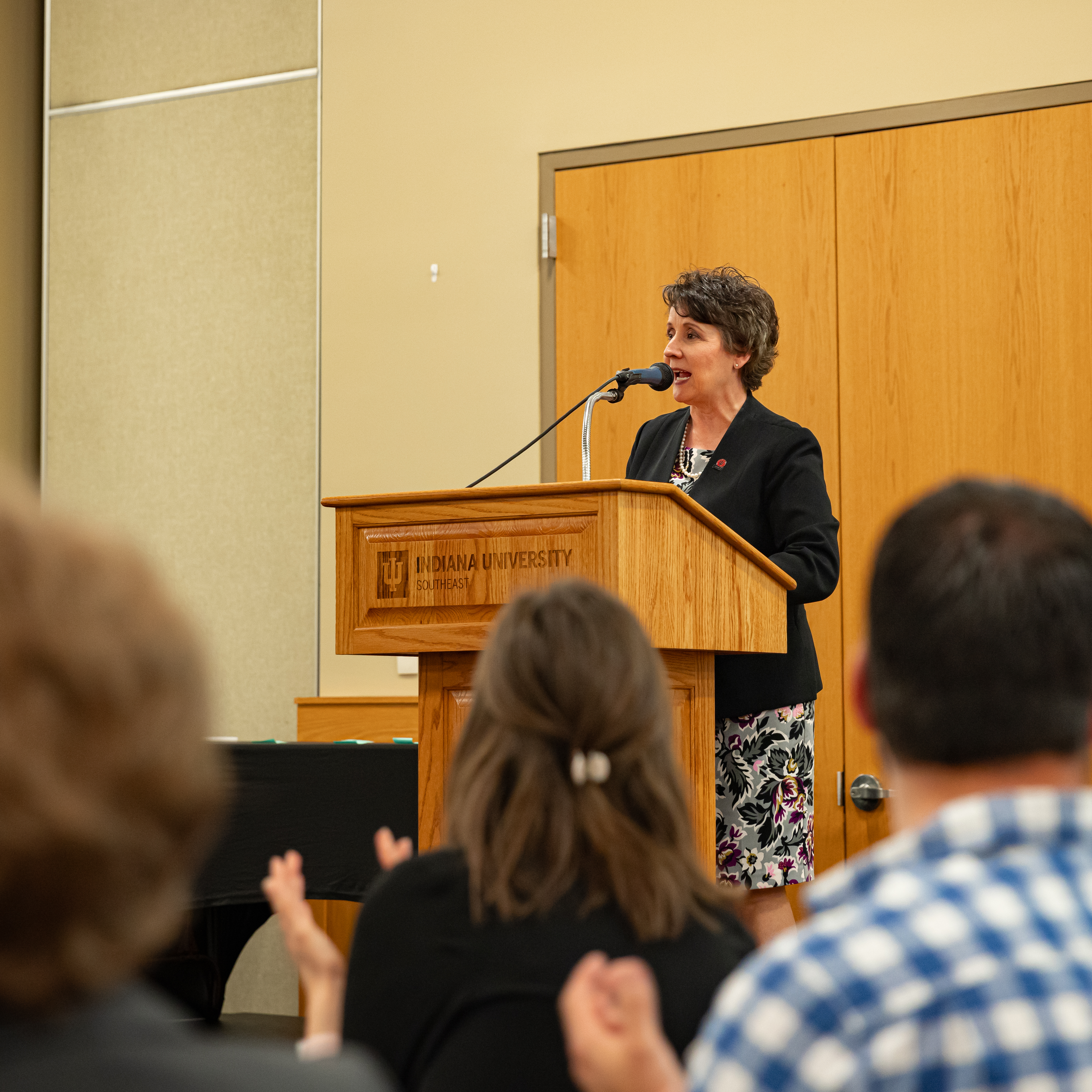Frequently Asked Questions
The nature of an emergency or disaster, either created by nature or humankind, is such that we cannot predict everything that might happen. In an effort to address some of the questions you might have, however, we've put together this list of questions and answers about how IU Southeast has prepared and how you can be better prepared.
Is IU Southeast a potential target for a terrorist attack?
There have been no specific threats or information regarding IU Southeast. Nonetheless, the director of the Federal Bureau of Investigation (in a statement made to a Senate committee in February 2003) has warned of possible terrorist attacks against colleges and universities, saying that institutions of higher education could be considered as "soft targets."
Will classes be canceled in anticipation of an emergency?
It is highly unusual for classes to be canceled. The campus will continue to operate as usual unless specific, credible information is obtained indicating an increased risk to the IU Southeast community. This information will be evaluated on a case-by-case basis by campus officials and relevant government agencies to determine the most appropriate course of action. Students, faculty, and staff should go about their normal activities unless directed otherwise.
What is the campus doing to prepare for an emergency?
In addition to establishing this emergency preparedness site to collect safety information in a central directory, the campus is:
- Adjusting security assignments accordingly for special events
- Working with campus offices to develop and disperse emergency action plans
- Identifying emergency contacts in buildings to lead others to safety
- Consulting with local, state, and national emergency management offices/agencies
- Conferring daily with local and federal law enforcement
- Educating members of the campus community as to measures they can take to increase their personal security
- IU Southeast Chancellor Patterson-Randles issued a statement to encourage freedom of inquiry, freedom of debate, and respect for the dignity and rights of others
- Supporting forums related to war issues
- Educating students, staff, and faculty about things they can do to increase their personal security
- Counseling students through our Counseling and Psychological Service
In the event of an emergency, how will the campus communicate with students, faculty, staff, and parents?
In case of an actual emergency, the campus will communicate by several means, including personal communication where appropriate, television and radio broadcast messages, outdoor warning sirens, e-mail, this emergency preparedness Web site, and the IU Southeast web site. Due to possible technology service interruptions, your best source for immediate, minute-to-minute information will likely be local television and radio, including:
Radio
Weather radios using Specific Area Message Encoding (SAME) are available at most electronics stores.
Television
- WHAS 11 (Cable Channel 4) ABC
- WLKY 32 (Cable Channel 5) CBS
- WAVE 3 (Cable Channel 6) NBC
- WDRB 41 (Cable Channel 9) FOX
- KET1 (Cable Channel 13) PBS
- KET2 (Cable Channel 15) PBS
Because the IU Southeast Police Department will be busy tending to any large-scale emergency that occurs, you should avoid calling them directly unless absolutely necessary. Parents, students, faculty, staff, and others can call 812-941-2567 (812-941-CLOS) for a looped informational message with up-to-date information. You can also call (812) 941-2333.
What should I do if I see suspicious activities or behaviors?
Please be alert and report any criminal incident, suspicious behavior, or improper security activity to the IU Southeast Police Department by dialing 2400 from any campus phone or (812) 941-2400 if you are off campus. You can dial 911 to reach the New Albany Police from a cellular or non-university phone.
What is being done to ensure the safety of IU Southeast students studying overseas?
The safety of students in our overseas study program is our highest priority, and we are taking all reasonable and feasible precautions so that students in our programs have safe experiences abroad. Still we realize the current international situation may be causing concern; we do have emergency plans in place for responding to any crises that should arise. The IU Office of Overseas Study will continue to monitor information from the U.S. Department of State and other official sources, to communicate with the program staff, and to stay in touch with students and their families and friends. For more information, visit the IU Office of Overseas Study Web site or call (812) 855-9304.
What resources and services are available to international students currently studying at IU Southeast, in light of the current, uncertain international situation?
There are a relatively small number of international students studying at IU Southeast, and we are committed to preserving their welfare, safety, security, and comfort. The International Student Advisor in the Office of Admissions should be considered the first source of information on immigration status, travel warnings, campus resources, and current announcements. IU Southeast is a place of diversity with an exceptionally strong community spirit. We are proud of our safe and civil community. The entire IU Southeast community is ready and available to be of assistance and support to our international students in the days and weeks to come. For more information contact Jodie Beatty, International Student Advisor at (812) 941-2190 or Frank Wadsworth, Director of International Programs at (812) 941-2531.
What if I'm a member of the Indiana military reserves and I'm called to active duty? How will my class registration and course work be handled?
We realize that students who are members of the reserves may be called to active duty, and we have a policy in place in order to minimize disruptions and inconveniences for students fulfilling their military responsibilities.
Are there counseling or psychological services available to help students cope with heightened stress or anxiety during these uncertain times?
What can I do to prepare for an emergency or disaster?
Your safety and the safety of the entire IU Southeast community are our foremost concern. However, we do recognize that each individual must take personal responsibility for his or her own safety. Here are some things you can do to be prepared in the event of an emergency or disaster:
- Be aware of security conditions by monitoring news sources to learn of changes in the advisory system and specific areas of concern.
- Create a personal plan that includes a method for making contact with family and friends in the event of disaster.
- Be aware of your surroundings. Identify exits, life safety equipment, building shelter areas, and emergency telephones.
- Have emergency supplies available, such as first aid kits and non-perishable food and water.
- Keep your automobile fuel tank full or nearly so.
- Be prepared for either an evacuation or to take shelter where you are.
- Avoid unsafe conditions due to overcrowding, poor lighting, or limited emergency exits.
- Report suspicious activity, packages, or conditions to your local law enforcement.
What should I do in the event of an emergency or disaster?
You should:
- Remain calm, be patient, use common sense, think before you act, and give assistance as needed.
- Follow the advice of local emergency officials.
- Closely monitor news reports and emergency alert systems for news and instructions.
- Keep ready access to your medicines and phone numbers.
- Avoid crowded public areas.
- If an attack occurs, stay away from the area.
- Know where emergency devices are located and the location of at least two emergency exits close to your living/working area.
- Make sure to have access to an adequate first aid kit.
You should not:
- Use the telephone (landline or cellular) except to report the emergency situation.
- Use elevators.
- Jeopardize your life or the lives of others by attempting to save personal or university property.
- Light matches or candles or turn on electrical switches.
What does it mean to "shelter-in-place?"
There are situations when it's simply best to stay where you are and avoid any uncertainty outside, a process known as "shelter-in-place." Use available information to assess the situation. If you see large amounts of debris in the air, or if local authorities say the air is badly contaminated, you may want to take this kind of action.
- Lock doors and close windows and air vents.
- Turn off fans, air conditioning, and forced air heating systems.
- Go into an interior room with few windows, if possible.
Seal all windows, doors, and air vents with plastic sheeting and duct tape. Consider measuring and cutting the sheeting in advance to save time. - Be prepared to improvise and use what you have on hand to seal gaps so that you create a barrier between yourself and any contamination.
- University and local authorities may not immediately be able to provide information on what is happening and what you should do. However, you should watch TV, listen to the radio, or check the Internet often for official news and instructions as they become available.
Emergency Contacts
On Campus Emergency
(812) 941-2400
Off Campus Emergency
911
Bad Weather Hotline
(812) 941-2567
Anonymous Tip Line
(812) 948-0684
Counseling and Psychological Services
(812) 941-2244
Floyd Memorial Hospital
(812) 944-7701
Indiana Poison Center
(800) 222-1222
Center for Women and Families Crisis Line
(812) 944-6743











